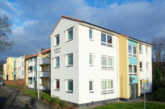A £500,000 retrofit project in South Lanarkshire has transformed 21 Clydesdale Housing Association homes to make them warmer and cheaper to heat.
Fourteen semi-detached properties and seven flats at Mill Place in Thankerton have each been fully retrofitted by Glasgow-based energy services company Union Technical to improve thermal efficiency.
The scope of work on the homes, constructed in 1996 and owned by Clydesdale Housing Association, is a Smarter Homes project for Union Technical — a new initiative which has been designed with a whole-house approach in mind. This has included installation of solar PV, zero emission heating and battery storage across all 21 properties, which will help residents save up to 60% on their energy bills.
Existing electric heating systems have been removed from all 14 semi-detached properties and replaced with air source heat pumps, which will significantly reduce the energy costs of each home and cut carbon emissions.
Heating systems in all seven flats have also been removed and replaced with smarter upgraded versions that will interact with the Solar PV, designed to help residents make substantial savings on their energy bills.
The works at Thankerton, which commenced in January, form part of an ongoing partnership between Union Technical and Clydesdale Housing Association.
Clydesdale Housing Association manages 742 properties throughout the Clydesdale area of rural South Lanarkshire. Established in 1987, over £30m of housing investment has been channelled through the Association, with more than 600 houses built.
Union Technical worked closely with Clydesdale Housing Association to finance the energy efficiency upgrades at Mill Place via paired application, which received 50% grant funding from the Scottish Government’s Social Housing Net Zero Heat Fund. The benefits from the fund not only support the Scottish Government’s aspirations towards net zero but also help reduce energy costs for tenants and future proof Clydesdale Housing Association assets.
Owen Coyle, Director at Union Technical, said: “Union Technical has been a proud partner of Clydesdale Housing Association for many years now. Having completed a similar project last year in the nearby villages of Rigside and Kirkmuirhill, we have seen first-hand the benefits our whole-house approach to retrofitting brings — cutting bills and reducing carbon emissions at the same time.
“Our dedicated team has completed work at Mill Place in a little over eight weeks, keeping disruption to a minimum and making sure residents can focus on the benefits the work to their homes will bring.”
Vicky Rogers, Deputy Chief Executive at Clydesdale Housing Association commented: “This is our second Smarter Homes project, partnered with Union Technical, and we are delighted with the outcome. Our Technical Services Officer, Nikki McLachlan, has worked closely with the Union Technical team to ensure that the work in our tenants’ homes has been completed with little disruption and on time.
“We are acutely aware of the difficulties our tenants are facing at present with the cost-of-living crisis and this is compounded with rising energy costs. The tenants are already realising savings on their energy bills and have praised both Union Technical and the Association for carrying out the much needed heating upgrades to their homes. We would like to thank Union Technical for their commitment to the project and to the Association’s tenants.”
Scottish social housing is subject to the Energy Efficiency Standard for Social Housing (EESSH), which aims to improve the energy efficiency of the social housing stock in Scotland. The EESSH sets minimum energy efficiency standards that social landlords are expected to achieve, with the goal of reducing energy consumption and CO2 emissions. The standard has seen periodic updates to reflect technological advancements and higher aspirations for energy efficiency.
A key objective of improving energy efficiency in social housing is to combat fuel poverty, which affects a significant number of households in Scotland. By making homes more energy-efficient, tenants can enjoy lower energy bills and better thermal comfort, contributing to a reduction in fuel poverty rates.
Scotland has set ambitious targets for reducing greenhouse gas emissions, with a legal requirement to achieve net-zero emissions by 2045. Social housing is expected to play a critical role in this effort, with ongoing research and innovation into the retrofitting of existing homes to improve energy efficiency further, Union Technical Services have established themselves as key player in Scotland supporting social landlords achieving there EESSH targets through the delivery of multi measure energy efficient retrofitting.









